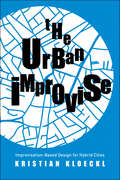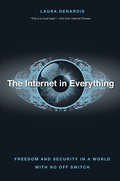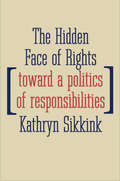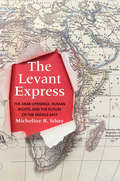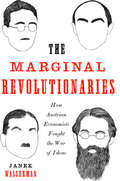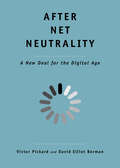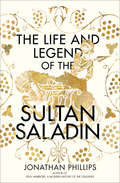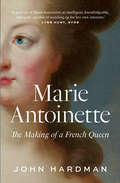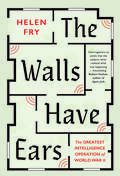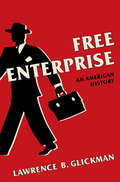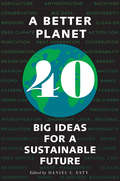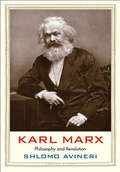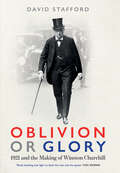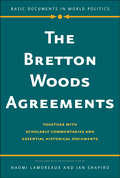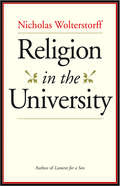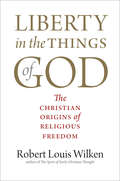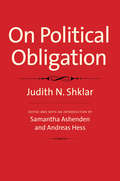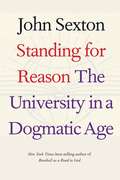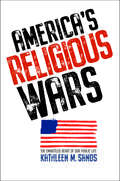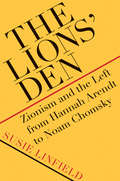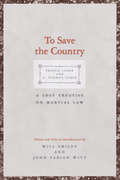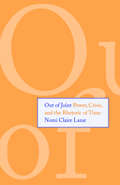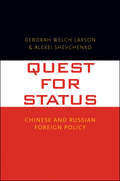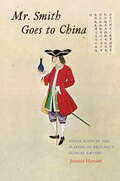- Table View
- List View
Climate Change from the Streets: How Conflict and Collaboration Strengthen the Environmental Justice Movement
by Michael MendezAn urgent and timely story of the contentious politics of incorporating environmental justice into global climate change policy Although the science of climate change is clear, policy decisions about how to respond to its effects remain contentious. Even when such decisions claim to be guided by objective knowledge, they are made and implemented through political institutions and relationships—and all the competing interests and power struggles that this implies. Michael Méndez tells a timely story of people, place, and power in the context of climate change and inequality. He explores the perspectives and influence low‑income people of color bring to their advocacy work on climate change. In California, activist groups have galvanized behind issues such as air pollution, poverty alleviation, and green jobs to advance equitable climate solutions at the local, state, and global levels. Arguing that environmental protection and improving public health are inextricably linked, Mendez contends that we must incorporate local knowledge, culture, and history into policymaking to fully address the global complexities of climate change and the real threats facing our local communities.
The Urban Improvise: Improvisation-Based Design for Hybrid Cities
by Kristian KloecklA book for architects, designers, planners, and urbanites that explores how cities can embrace improvisation to improve urban life The built environment in today’s hybrid cities is changing radically. The pervasiveness of networked mobile and embedded devices has transformed a predominantly stable background for human activity into spaces that have a more fluid behavior. Based on their capability to sense, compute, and act in real time, urban spaces have the potential to go beyond planned behaviors and, instead, change and adapt dynamically. These interactions resemble improvisation in the performing arts, and this book offers a new improvisation-based framework for thinking about future cities. Kristian Kloeckl moves beyond the smart city concept by unlocking performativity, and specifically improvisation, as a new design approach and explores how city lights, buses, plazas, and other urban environments are capable of behavior beyond scripts. Drawing on research of digital cities and design theory, he makes improvisation useful and applicable to the condition of today’s technology-imbued cities and proposes a new future for responsive urban design.
The Internet in Everything: Freedom and Security in a World with No Off Switch
by Laura DeNardisA compelling argument that the Internet of things threatens human rights and security and that suggests policy prescriptions to protect our future The Internet has leapt from human-facing display screens into the material objects all around us. In this so-called Internet of Things—connecting everything from cars to cardiac monitors to home appliances—there is no longer a meaningful distinction between physical and virtual worlds. Everything is connected. The social and economic benefits are tremendous, but there is a downside: an outage in cyberspace can result not only in a loss of communication but also potentially a loss of life. Control of this infrastructure has become a proxy for political power, since countries can easily reach across borders to disrupt real-world systems. Laura DeNardis argues that this diffusion of the Internet into the physical world radically escalates governance concerns around privacy, discrimination, human safety, democracy, and national security, and she offers new cyber-policy solutions. In her discussion, she makes visible the sinews of power already embedded in our technology and explores how hidden technical governance arrangements will become the constitution of our future.
The Hidden Face of Rights: Toward a Politics of Responsibilities (Castle Lecture Series)
by Kathryn SikkinkWhy we cannot truly implement human rights unless we also recognize human responsibilities When we debate questions in international law, politics, and justice, we often use the language of rights—and far less often the language of responsibilities. Human rights scholars and activists talk about state responsibility for rights, but they do not articulate clear norms about other actors&’ obligations. In this book, Kathryn Sikkink argues that we cannot truly implement human rights unless we also recognize and practice the corresponding human responsibilities. Focusing on five areas—climate change, voting, digital privacy, freedom of speech, and sexual assault—where on-the-ground (primarily university campus) initiatives have persuaded people to embrace a close relationship between rights and responsibilities, Sikkink argues for the importance of responsibilities to any comprehensive understanding of political ethics and human rights.
The Levant Express: The Arab Uprisings, Human Rights, and the Future of the Middle East
by Micheline R. IshayA surprisingly hopeful assessment of the prospects for human rights in the Middle East, and a blueprint for advancing them The enormous sense of optimism unleashed by the Arab Spring in 2011 soon gave way to widespread suffering and despair. Of the many popular uprisings against autocratic regimes, Tunisia’s now stands alone as a beacon of hope for sustainable human rights progress. Libya is a failed state; Egypt returned to military dictatorship; the Gulf States suppressed popular protests and tightened control; and Syria and Yemen are ravaged by civil war. Challenging the widely shared pessimism among regional experts, Micheline Ishay charts bold and realistic pathways for human rights in a region beset by political repression, economic distress, sectarian conflict, a refugee crisis, and violence against women. With due attention to how patterns of revolution and counterrevolution play out in different societies and historical contexts, Ishay reveals the progressive potential of subterranean human rights forces and offers strategies for transforming current realities in the Middle East.
The Marginal Revolutionaries: How Austrian Economists Fought the War of Ideas
by Janek WassermanA group history of the Austrian School of Economics, from the coffeehouses of imperial Vienna to the modern-day Tea Party The Austrian School of Economics—a movement that has had a vast impact on economics, politics, and society, especially among the American right—is poorly understood by supporters and detractors alike. Defining themselves in opposition to the mainstream, economists such as Ludwig von Mises, Friedrich Hayek, and Joseph Schumpeter built the School's international reputation with their work on business cycles and monetary theory. Their focus on individualism—and deep antipathy toward socialism—ultimately won them a devoted audience among the upper echelons of business and government. In this collective biography, Janek Wasserman brings these figures to life, showing that in order to make sense of the Austrians and their continued influence, one must understand the backdrop against which their philosophy was formed—notably, the collapse of the Austro‑Hungarian Empire and a half‑century of war and exile.
After Net Neutrality: A New Deal for the Digital Age (The Future Series)
by Victor Pickard David Elliot BermanA provocative analysis of net neutrality and a call to democratize online communication This short book is both a primer that explains the history and politics of net neutrality and an argument for a more equitable framework for regulating access to the internet. Pickard and Berman argue that we should not see internet service as a commodity but as a public good necessary for sustaining democratic society in the twenty-first century. They aim to reframe the threat to net neutrality as more than a conflict between digital leviathans like Google and internet service providers like Comcast but as part of a much wider project to commercialize the public sphere and undermine the free speech essential for democracy. Readers will come away with a better understanding of the key concepts underpinning the net neutrality battle and rallying points for future action to democratize online communication.
The Life and Legend of the Sultan Saladin
by Jonathan PhillipsAn engaging biography that offers a new perspective on one of the most influential figures of the Crusades In 1187, Saladin marched triumphantly into Jerusalem, ending decades of struggle against the Christians and reclaiming the holy city for Islam. Four years later he fought off the armies of the Third Crusade, which were commanded by Europe’s leading monarchs. A fierce warrior and savvy diplomat, Saladin’s unparalleled courtesy, justice, generosity, and mercy were revered by both his fellow Muslims and his Christian rivals such as Richard the Lionheart. Combining thorough research with vivid storytelling, Jonathan Phillips offers a fresh and captivating look at the triumphs, failures, and contradictions of one of the Crusades’ most unique figures. Bringing the vibrant world of the twelfth century to life, this book also explores Saladin’s complicated legacy, examining the ways Saladin has been invoked in the modern age by Arab and Muslim leaders ranging from Nasser in Egypt, Asad in Syria, and Saddam Hussein in Iraq to Osama bin Laden, as well as his huge appeal across popular culture in books, drama, and music.
Marie-Antoinette: The Making of a French Queen
by John HardmanThis “wonderfully gripping biography” digs beneath the famous legend to present a nuanced and revealing portrait of a serious-mined monarch (Allan Massie, Wall Street Journal).As the last Queen of France before the French Revolution, Marie-Antoinette was mistrusted and reviled in her own time, while today she is portrayed as a lightweight incapable of understanding the events that engulfed her. But who was she really? In this new account, John Hardman redresses the balance and sheds fresh light on her story.Hardman shows how Marie-Antoinette played a significant but misunderstood role in the crisis of the monarchy. Drawing on new sources, he describes how she refused to prioritize the aggressive foreign policy of her mother, bravely took over the helm from her faltering husband, and, when revolution broke out, worked closely with repentant radicals to give the constitutional monarchy a fighting chance. For the first time, Hardman demonstrates exactly what influence Marie-Antoinette had and when and how she exerted it.Named a 2020 Book of the Year by The Spectator
The Walls Have Ears: The Greatest Intelligence Operation of World War II
by Helen FryA history of the elaborate and brilliantly sustained World War II intelligence operation by which Hitler’s generals were tricked into giving away vital Nazi secrets At the outbreak of World War II, MI6 spymaster Thomas Kendrick arrived at the Tower of London to set up a top secret operation: German prisoners’ cells were to be bugged and listeners installed behind the walls to record and transcribe their private conversations. This mission proved so effective that it would go on to be set up at three further sites—and provide the Allies with crucial insight into new technology being developed by the Nazis. In this astonishing history, Helen Fry uncovers the inner workings of the bugging operation. On arrival at stately-homes-turned-prisons like Trent Park, high-ranking German generals and commanders were given a "phony" interrogation, then treated as "guests," wined and dined at exclusive clubs, and encouraged to talk. And so it was that the Allies got access to some of Hitler’s most closely guarded secrets—and from those most entrusted to protect them.
Free Enterprise: An American History
by Lawrence B. GlickmanAn incisive look at the intellectual and cultural history of free enterprise and its influence on American politics Throughout the twentieth century, “free enterprise” has been a contested keyword in American politics, and the cornerstone of a conservative philosophy that seeks to limit government involvement into economic matters. Lawrence B. Glickman shows how the idea first gained traction in American discourse and was championed by opponents of the New Deal. Those politicians, believing free enterprise to be a fundamental American value, held it up as an antidote to a liberalism that they maintained would lead toward totalitarian statism. Tracing the use of the concept of free enterprise, Glickman shows how it has both constrained and transformed political dialogue. He presents a fascinating look into the complex history, and marketing, of an idea that forms the linchpin of the contemporary opposition to government regulation, taxation, and programs such as Medicare.
A Better Planet: Forty Big Ideas for a Sustainable Future
by Daniel C. Esty Ingrid C. BurkeA practical, bipartisan call to action from the world’s leading thinkers on the environment and sustainability Sustainability has emerged as a global priority over the past several years. The 2015 Paris Agreement on climate change and the adoption of the seventeen Sustainable Development Goals through the United Nations have highlighted the need to address critical challenges such as the buildup of greenhouse gases in the atmosphere, water shortages, and air pollution. But in the United States, partisan divides, regional disputes, and deep disagreements over core principles have made it nearly impossible to chart a course toward a sustainable future. This timely new book, edited by celebrated scholar Daniel C. Esty, offers fresh thinking and forward-looking solutions from environmental thought leaders across the political spectrum. The book’s forty essays cover such subjects as ecology, environmental justice, Big Data, public health, and climate change, all with an emphasis on sustainability. The book focuses on moving toward sustainability through actionable, bipartisan approaches based on rigorous analytical research.
Karl Marx: Philosophy and Revolution (Jewish Lives)
by Shlomo AvineriThis new exploration of Marx as a Jewish thinker presents “a perceptive and fair-minded corrective to superficial treatments” of his life and work (Jonathan Rose, Wall Street Journal).A philosopher, historian, sociologist, economist, current affairs journalist, and editor, Karl Marx was one of the most influential and revolutionary thinkers of modern history. But he is rarely thought of as a Jewish thinker, and his Jewish background is either overlooked or misrepresented. Here, distinguished scholar Shlomo Avineri argues that Marx’s Jewish origins made a significant impression on his work. Marx was born in Trier, then part of Prussia, and his family had enjoyed full emancipation under earlier French control of the area. But then its annexation to Prussia deprived the Jewish population of its equal rights. These developments led to the reluctant conversion of Marx’s father, and similar tribulations radicalized many other Jewish intellectuals of that time.Avineri puts Marx’s Jewish background in its proper and balanced perspective, and traces Marx’s intellectual development in light of the historical, intellectual, and political contexts in which he lived.
Oblivion or Glory: 1921 and the Making of Winston Churchill
by David Stafford“[The book’s] power lies in a vivid re-creation not only of Churchill’s public roles but also his private life—of good fortune but also family tragedy.” —The Wall Street JournalAn engaging and original account of 1921, a pivotal year for Churchill that had a lasting impact on his political and personal legacyAfter the tragic consequences of his involvement in the catastrophic Dardanelles Campaign of World War I, Churchill’s political career seemed over. He was widely regarded as little more than a bombastic and unpredictable buccaneer until, in 1921, an unexpected inheritance heralded a series of events that laid the foundations for his future success.Renowned Churchill scholar David Stafford delves into the statesman’s life in 1921, the year in which his political career revived. From his political negotiations in the Anglo-Irish treaty that created the Irish Free State to his tumultuous relationship with his “wild cousin” Clare Sheridan, sculptor of Lenin and subject of an MI5 investigation, this is an engaging portrait of this overlooked yet pivotal year in the great man’s life.“Sheds dazzling new light on both the man and the epoch.” —Piers Brendon, author of The Decline and Fall of the British Empire 1781–1997“A brilliant portrayal of the triumphs and tribulations of Churchill’s middle age.” —Paul Addison, author of Churchill: The Unexpected Hero“Vividly adds perspectives and colour to a busy yet little known year of Churchill’s life that most biographies can only treat in monochrome.” —David Lough, author of No More Champagne: Churchill and His Money“A fascinating and fluent account of Churchill’s efforts to win the peace and hold together the Empire.” —Lawrence James, author of Churchill and Empire
The Bretton Woods Agreements: Together with Scholarly Commentaries and Essential Historical Documents (Basic Documents in World Politics)
by Ian Shapiro Naomi LamoreauxCommentaries by top scholars alongside the most important documents and speeches concerning the Bretton Woods Conference of 1944 The two world wars brought an end to a long-standing system of international commerce based on the gold standard. After the First World War, the weaknesses in the gold standard contributed to hyperinflation, the Great Depression, the rise of fascism, and ultimately World War II. The Bretton Woods Conference of 1944 arose out of the Allies’ desire to design a postwar international economic system that would provide a basis for prosperity, trade, and worldwide economic development. Alongside important documents and speeches concerning the adoption and evolution of the Bretton Woods system, this volume includes lively, readable, original essays on such topics as why the gold standard was doomed, how Bretton Woods encouraged the adoption of Keynesian economics, how the agreements influenced late‑twentieth‑century ideas of international development, and why the agreements ultimately had to give way to other arrangements.
Religion in the University
by Nicholas WolterstorffFrom one of the world’s leading philosophers, this is a powerful defense of religion’s role within the modern university What is religion’s place within the academy today? Are the perspectives of religious believers acceptable in an academic setting? In this lucid and penetrating essay, Nicholas Wolterstorff ranges from Max Weber and John Locke to Ludwig Wittgenstein and Charles Taylor to argue that religious orientations and voices do have a home in the modern university, and he offers a sketch of what that home should be like. He documents the remarkable changes have occurred within the academy over the past five decades with regard to how knowledge is understood. During the same period, profound philosophical advancements have also been made in our understanding of religious belief. These shifting ideals, taken together, have created an environment that is more pluralistic than secular. Tapping into larger debates on freedom of expression and intellectual diversity, Wolterstorff believes a scholarly ethic should guard us against becoming, in Weber’s words, “specialists without spirit and sensualists without heart.”
Liberty in the Things of God: The Christian Origins of Religious Freedom
by Robert Louis WilkenFrom one of the leading historians of Christianity comes this sweeping reassessment of religious freedom, from the church fathers to John Locke In the ancient world Christian apologists wrote in defense of their right to practice their faith in the cities of the Roman Empire. They argued that religious faith is an inward disposition of the mind and heart and cannot be coerced by external force, laying a foundation on which later generations would build. Chronicling the history of the struggle for religious freedom from the early Christian movement through the seventeenth century, Robert Louis Wilken shows that the origins of religious freedom and liberty of conscience are religious, not political, in origin. They took form before the Enlightenment through the labors of men and women of faith who believed there could be no justice in society without liberty in the things of God. This provocative book, drawing on writings from the early Church as well as the sixteenth and seventeenth centuries, reminds us of how “the meditations of the past were fitted to affairs of a later day.”
On Political Obligation
by Judith N. ShklarA compelling set of lectures on political obligation that contributes to ongoing debates in political theory and intellectual history This stimulating collection of lectures by the late Judith Shklar on political obligation is paired with a scholarly introduction that offers an overview of her life, illuminates the connections among her teaching, research, and publications, and explains why her lectures still resonate with us and contribute to current debates in political theory and intellectual history.
Standing for Reason: The University in a Dogmatic Age
by John SextonA powerful case for the importance of universities as an antidote to the “secular dogmatism” that increasingly infects political discourse John Sexton argues that over six decades, a “secular dogmatism,” impenetrable by dialogue or reason, has come to dominate political discourse in America. Political positions, elevated to the status of doctrinal truths, now simply are “revealed.” Our leaders and our citizens suffer from an allergy to nuance and complexity, and the enterprise of thought is in danger. Sexton sees our universities, the engines of knowledge and stewards of thought, as the antidote, and he describes the policies university leaders must embrace if their institutions are to serve this role. Acknowledging the reality of our increasingly interconnected world—and drawing on his experience as president of New York University when it opened campuses in Abu Dhabi and Shanghai—Sexton advocates for “global network universities” as a core aspect of a new educational landscape and as the crucial foundation-blocks of an interlocking world characterized by “secular ecumenism.”
America’s Religious Wars: The Embattled Heart of Our Public Life
by Kathleen M. SandsHow American conflicts about religion have always symbolized our foundational political values When Americans fight about “religion,” we are also fighting about our conflicting identities, interests, and commitments. Religion-talk has been a ready vehicle for these conflicts because it is built on enduring contradictions within our core political values. The Constitution treats religion as something to be confined behind a wall, but in public communications, the Framers treated religion as the foundation of the American republic. Ever since, Americans have translated disagreements on many other issues into an endless debate about the role of religion in our public life. Built around a set of compelling narratives—George Washington’s battle with Quaker pacifists; the fight of Mormons and Catholics for equality with Protestants; Teddy Roosevelt’s concept of land versus the Lakota’s concept; the creation-evolution controversy; and the struggle over sexuality—this book shows how religion, throughout American history, has symbolized, but never resolved, our deepest political questions.
The Lions' Den: Zionism and the Left from Hannah Arendt to Noam Chomsky
by Susie LinfieldA lively intellectual history that explores how prominent midcentury public intellectuals approached Zionism and then the State of Israel itself and its conflicts with the Arab world In this lively intellectual history of the political Left, cultural critic Susie Linfield investigates how eight prominent twentieth-century intellectuals struggled with the philosophy of Zionism, and then with Israel and its conflicts with the Arab world. Constructed as a series of interrelated portraits that combine the personal and the political, the book includes philosophers, historians, journalists, and activists such as Hannah Arendt, Arthur Koestler, I. F. Stone, and Noam Chomsky. In their engagement with Zionism, these influential thinkers also wrestled with the twentieth century’s most crucial political dilemmas: socialism, nationalism, democracy, colonialism, terrorism, and anti-Semitism. In other words, in probing Zionism, they confronted the very nature of modernity and the often catastrophic histories of our time. By examining these leftist intellectuals, Linfield also seeks to understand how the contemporary Left has become focused on anti-Zionism and how Israel itself has moved rightward.
To Save the Country: A Lost Treatise on Martial Law (Yale Law Library Series in Legal History and Reference)
by Francis Lieber G. Norman LieberA Civil War-era treatise addressing the power of governments in moments of emergency The last work of Abraham Lincoln’s law of war expert Francis Lieber was long considered lost—until Will Smiley and John Fabian Witt discovered it in the National Archives. Lieber’s manuscript on emergency powers and martial law addresses important contemporary debates in law and political philosophy and stands as a significant historical discovery. As a key legal advisor to the Lincoln White House, Columbia College professor Francis Lieber was one of the architects and defenders of Lincoln’s most famous uses of emergency powers during the Civil War. Lieber’s work laid the foundation for rules now accepted worldwide. In the years after the war, Lieber and his son turned their attention to the question of emergency powers. The Liebers’ treatise addresses a vital question, as prominent since 9/11 as it was in Lieber’s lifetime: how much power should the government have in a crisis? The Liebers present a theory that aims to preserve legal restraint, while giving the executive necessary freedom of action. Smiley and Witt have written a lucid introduction that explains how this manuscript is a key discovery in two ways: both as a historical document and as an important contribution to the current debate over emergency powers in constitutional democracies.
Out of Joint: Power, Crisis, and the Rhetoric of Time
by Nomi Claire LazarHow constructions of time shape political beliefs about what is possible—and what is inevitable To secure power in a crisis, leaders must sell deep change as a means to future good. But how could we know the future? Nomi Claire Lazar draws on stories across a range of cultures and contexts, ancient and modern, to show how leaders use constructions of time to frame events. These frames carry an implicit promise to secure or subvert an expected future, shaping belief in what is possible—and what is inevitable. “Ranging imaginatively across history and geography, this elegant book probes temporal sources of order and transformation. Its analytical wisdom discloses how calendars and representations of time shape political legitimacy, dispositions, and action.”—Ira I. Katznelson, author of Fear Itself: The New Deal and the Origins of Our Time “Great political leaders, for good or ill, seek to shape our daily lives by playing with time itself. That is the central insight of this elegant, erudite volume, one that means I will henceforth listen to speeches and manifestos with new ears and new tools to rebut them.”—Anne-Marie Slaughter, President and CEO, New America “Nomi Lazar gives us a fascinating exploration of the political construction of time itself, as structured by calendars, dating systems, and other mechanisms used for legitimation, revolution, and a myriad of other political purposes. A memorable and endlessly interesting book.”—Adrian Vermeule, Harvard Law School
Quest for Status: Chinese and Russian Foreign Policy
by Deborah Welch Larson Alexei ShevchenkoA look at how the desire to improve international status affects Russia's and China's foreign policies Deborah Welch Larson and Alexei Shevchenko argue that the desire for world status plays a key role in shaping the foreign policies of China and Russia. Applying social identity theory—the idea that individuals derive part of their identity from larger communities—to nations, they contend that China and Russia have used various modes of emulation, competition, and creativity to gain recognition from other countries and thus validate their respective identities. To make this argument, they analyze numerous cases, including Catherine the Great’s attempts to westernize Russia, China’s identity crises in the nineteenth century, and both countries’ responses to the end of the Cold War. The authors employ a multifaceted method of measuring status, factoring in influence and inclusion in multinational organizations, military clout, and cultural sway, among other considerations. Combined with historical precedent, this socio-psychological approach helps explain current trends in Russian and Chinese foreign policy.
Mr. Smith Goes to China: Three Scots in the Making of Britain's Global Empire
by Jessica HanserAn account of eighteenth-century global commerce as seen through the lives of three Scottish traders, “written with verve and filled with arresting details” (Tonio Andrade, author of The Gunpowder Age).This book delves into the lives of three Scottish private traders—George Smith of Bombay, George Smith of Canton, and George Smith of Madras—and uses them as lenses through which to explore the inner workings of Britain’s imperial expansion and global network of trade, revealing how an unstable credit system and a financial crisis ultimately led to greater British intervention in India and China.“This book is a history of British seafaring and imperialism, written largely from a micro-level perspective, placing the focus on individual traders rather than the East India Company as a whole. But it is not only an imperial history. It also unravels the interwoven financial, political and social relations between Britain, China and India in the eighteenth century . . . Hanser has consulted an impressively wide range of archival sources in different languages and located in various countries, from private letters to periodicals, and from official Chinese documents to East India Company reports. Her work contributes to our understanding of 18th-century British imperial history.” —Reviews in History

